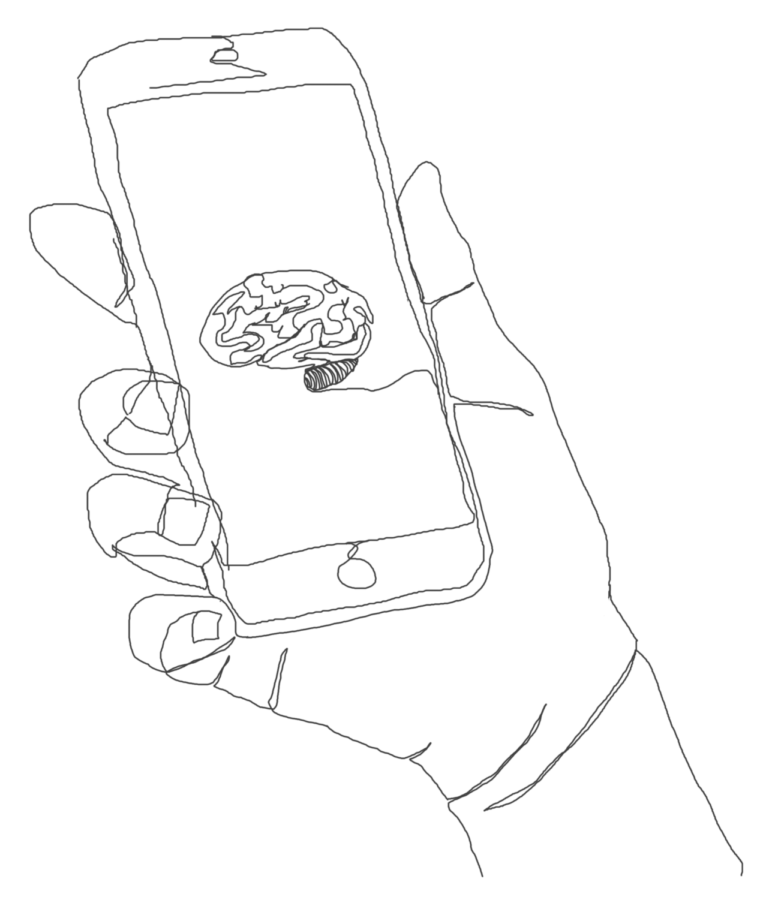TECHnically, Your Brain Is Changing How it Works
Dylan Gates & Jane Zou
As more of the developed world has regular access to mobile devices, some teenagers cannot fathom living independent from technology.
February 5, 2019
The brain defines us as human; the abilities to think and feel emotions distinguish us from other forms of intelligence. However, with our increasing usage of technology, our brains have changed significantly, altering our attention spans, thinking abilities and health.
Technology keeps us in a state of perpetual distraction and constant interruptions. Psychologists have proven that these distractions profoundly change our brains’ functions, making it increasingly difficult to engage in long contemplative thought.
Neurologists are concerned with technology’s unknown effects in relation to our brain’s malleability. Described as the “dark side of brain plasticity” by journalist Nicholas Carr, our brains are adapting to the fast-paced method of absorbing information yet becoming slower and lazier.
“I get at least one patient a week who is convinced that forgetting things like car keys or picking up children is the result of a serious brain condition or early Alzheimer’s,” neuropsychologist and professor Michael Saling said in an interview with the University of Melbourne. “The truth is the expansion of the information age has happened so fast, it’s bringing us face to face with our brains’ limitations. Just because our computer devices have perfect memories we think we should too.”
Being able to quickly access information with simple clicks makes us impatient, and younger generations raised with easy access to technology may face alarming detriments.
According to the National Alliance on Mental Illness (NAMI) in 2011, over half of the surveyed minors watch television, surf the internet or use another form of social media when doing homework, leading to reduced productivity. A lack of productivity is similar to symptoms of certain mental disorders, such as attention deficit hyperactivity disorder (ADHD). This correlated increase has left parents concerned for their teenagers’ mental health.
According to NAMI, when forcefully removing technological stimulants in school or work settings, teenagers may experience withdrawal symptoms characteristic of drug addicts. Electronic devices and connection to social media release dopamine, a chemical that accompanies instant gratification, like when a notification pops up.
“They’ll go into their rooms and read or play video games or talk on the phone,” professor of psychiatry and human behavior Mary Carskadon said in an interview with PBS. “And they’re perfectly content and happy doing that, because they’re also at a phase where it’s easy for them to become aroused and stimulated by these activities.”
Electronic devices emit a blue-tinted light that suppresses the production of melatonin, a hormone that helps induce quality sleep, according to the National Sleep Foundation. Although some may enable warm-toned screens, the brightness from the screen alone can prohibit sleep for another hour because it interferes with the body’s circadian rhythm. Being online stimulates the brain while the body is exhausted, thus discontinuity between the body and the mind can cause restlessness.
Nevertheless, technology will continue to affect future generations as it becomes routine. While current research may be alarming, there is room for groundbreaking evidence that may change our perspective on technology.
“I am optimistic and excited by what future research will reveal into the workings of the human brain and the extraordinary process by which it is translated into a uniquely individual mind,” professor and scientist Susan Greenfield said in an interview with Daily Mail.













![Softball coach Lili Belton plays in a collegiate softball game on Westcliff University’s team. Belton completes a back door slide safe at home to avoid the tag and score the run.“ [She] takes it very seriously and what [she] brings to the program is skill and discipline, and kind of just this youthful experience,” head softball coach Alexandra Dobbs said. “I would say [she] is this perfect combination of sensitive and kind, but driven and serious.”](https://portolapilot.com/wp-content/uploads/2024/03/lili-belton-600x400.png)


